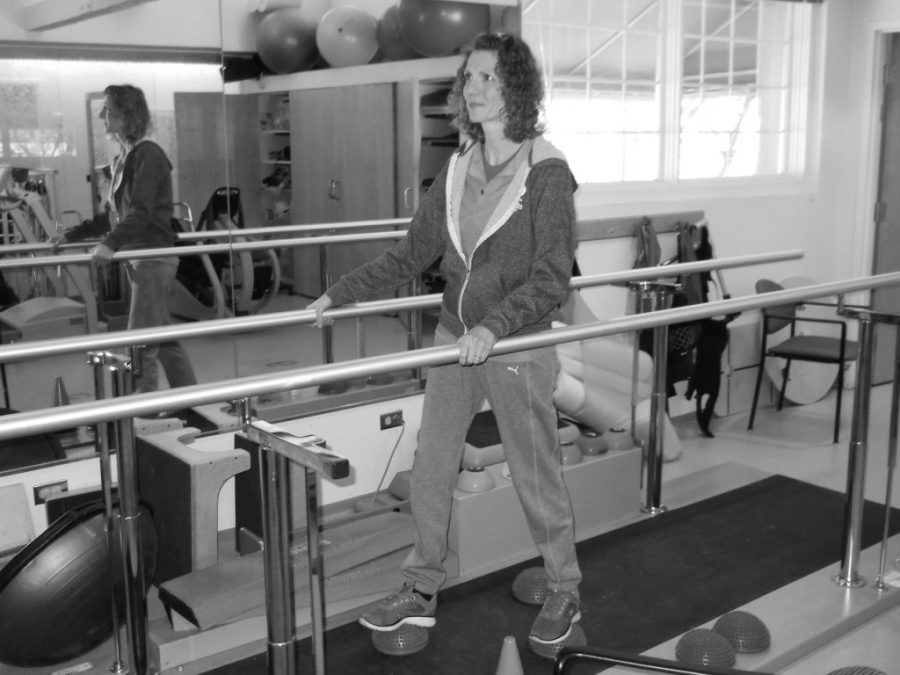Meyer’s passion for teaching perseveres in the face of adversity
Tenacious Titan: Completing her rehab exercises at the Ability Institute of RIC, Kristin Meyer, program director and conductor of the Glenbrook Symphony Orchestra, perseveres despite severe injuries after the plane crash. Photo courtesy of Kristin Meyer.
February 12, 2021
The sun was low in the sky on that Sunday afternoon six years ago in Monee, Illinois. Suddenly, the plane hit the power lines, the aircraft shuddered, the field of weeds below rushed up and Kristin Meyer braced for impact.
On Sept. 7, 2014, Meyer, program director and conductor of the Glenbrook Symphony Orchestra, was traveling in a plane on a sight-seeing flight as part of a family get-together. The flight had been in the air for about 45 minutes when the plane crashed, Meyer explained.
“When the plane hit the power lines, I told myself I would make it,” Meyer said. “I thought, ‘If I’m not paralyzed and I can move, I will find a way to get help and get us out of this.’”
When Meyer awoke after being unconscious, she was upside down in the plane and had to use the emergency seat belt release. Then, Meyer saw that the pilot was unconscious and bleeding, so she carried him out of the plane and tended to his severe wounds.
After Meyer slowed down the pilot’s bleeding, he regained consciousness and she used his cell phone to call for help, she explained. It was then Meyer noticed she was having difficulty breathing, impaired vision and her shoulder and left arm were not moving properly. After almost an hour, she heard sirens in the distance, and walked towards them. Finally, she saw her husband run towards her.
“One of the most vivid memories I have from that day is seeing my husband jump out of a car and run toward me,” Meyer said. “At that moment I knew I was rescued. All the strength I had been mustering to keep breathing and to help guide the first responders to our location just ran out and I collapsed.”
Carl Meyer, Kristin’s husband, still gets chills remembering the call from his wife that day, he explained. As difficult as the past few years have been, Carl is amazed by Kristin’s perseverance and empathy and is, above all, reminded to never take life for granted.
“Her journey has strengthened her spirit during recovery and brought us even closer together as a family,” Carl said. “Life is fragile and not to be taken lightly. We pick up the pieces and optimistically move forward.”
Kristin had severe injuries as a result of her accident, including traumatic brain injury, lung injuries, damage to her retinas and broken ribs. The Brain Injury Association of America, or the BIA, states that traumatic brain injury can damage parts of the brain permanently since the neurons in the brain do not regenerate. However, the BIA explained that rehabilitation aids in helping individuals recover as quickly and effectively as possible.
“Physically, the recovery was and remains extensive,” Kristin said. “I truly thought that I would recover and be stronger for it. And in some ways, as a human, I am stronger. I try to lead with kindness and with the idea that one never knows what challenges another might be facing.”
Nearly six years later, Kristin is a graduate from an intensive inpatient rehab program at the Ability Institute of RIC and remains in outpatient rehab. She continues to deal with effects of her brain injury, such as headaches, she explained.
Kristin’s daughter, Elisabeth Meyer, tries to emulate her mom’s strength and patience. From driving her to rehab to playing music to help her fall asleep, Elisabeth has supported her mom in many ways, she explained.
“Metal and screws made the plane strong enough to shield my mom and the pilot from losing their lives, but human strength in rebuilding a life is even more impressive and inspiring,” Elisabeth said.
Kristin has found immense support from those around her, she said. Kristin was told that she would never return to teaching, but she did not let this prognosis stop her.
“When I was told that I might not recover enough to return to teaching, I knew I would,” Kristin said. “My answer was always, The heart wants what the heart wants. And my heart was and is with the orchestra and making music together. I will continue to do that as long as I’m able and remain grateful for each day, and each note, along the way.”



